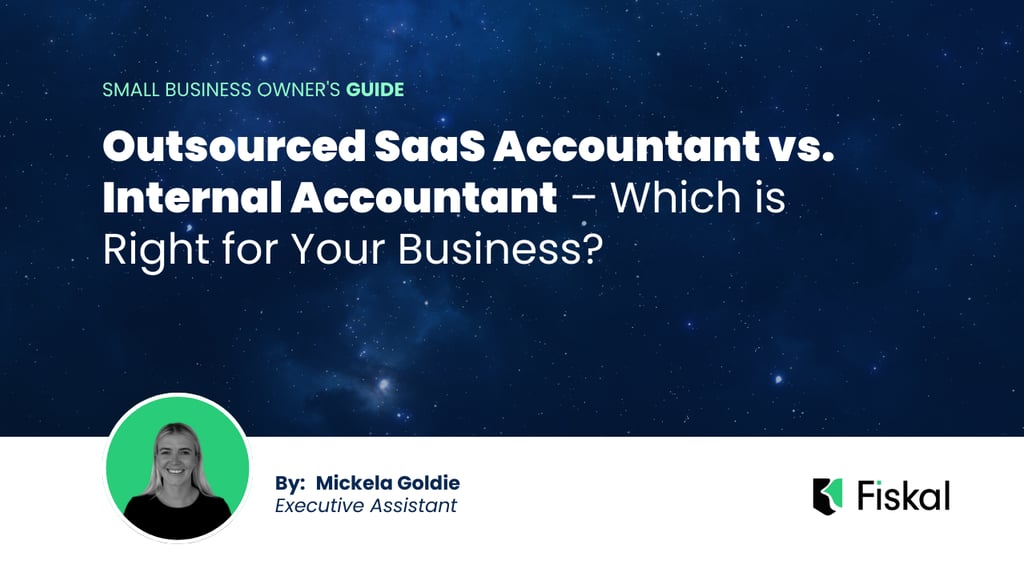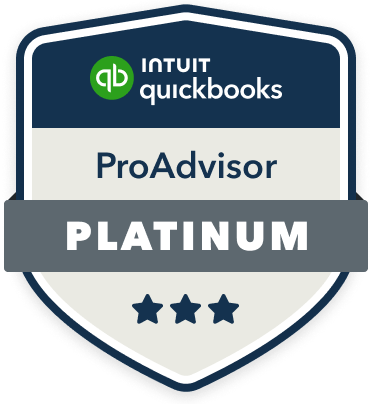The Pros and Cons: Outsourced SaaS Accountant vs. Internal Accountant – Which is Right for Your Business?
Are you torn between hiring an outsourced SaaS accountant or an internal accountant for your business? Making the right choice can have a significant impact on your financial operations and overall success. In this article, we will weigh the pros and cons of both options to help you make an informed decision. Outsourced SaaS accountants bring the advantage of specialized expertise without the need for office space or additional equipment. They work remotely and offer scalable solutions, which can be particularly beneficial for small and medium-sized businesses. On the other hand, internal accountants provide a deeper level of understanding of your company's intricacies and can offer real-time insights into its financial health. To determine which option is right for your business, it's crucial to consider factors such as cost, flexibility, control and security. Both outsourced SaaS accountants and internal accountants have their own unique advantages and drawbacks that may sway your decision. Join us as we delve into the pros and cons of both options, helping you make a well-informed choice that aligns with your business goals.
SYSTEMS AND SOFTWARE


What is SaaS accounting?
SaaS (Software as a Service) accounting refers to the use of cloud-based accounting software and services that are delivered over the internet. With SaaS accounting, businesses no longer need to install and maintain accounting software on their own servers or computers. Instead, the software and data are hosted and managed by the SaaS provider, allowing users to access the system from any device with an internet connection.
This model offers several advantages, including reduced upfront costs, automatic software updates, and enhanced data security. SaaS accounting solutions often provide a wide range of features, such as invoicing, expense tracking, payroll management and financial reporting, all accessible through a user-friendly web-based interface. By outsourcing the accounting function to a SaaS provider, businesses can focus on their core operations while benefiting from professional financial management and the latest accounting technology.
The rise of SaaS accounting has transformed the way businesses approach their financial management, offering a more flexible, scalable and cost-effective alternative to traditional on-premise accounting software. As more companies embrace the SaaS model, the demand for outsourced SaaS accountants has grown, making it an increasingly popular option for businesses of all sizes.
Pros of outsourcing SaaS accounting
One of the primary advantages of outsourcing SaaS accounting is the access to specialized expertise. SaaS accounting providers employ teams of experienced accountants and financial professionals who are well-versed in the latest accounting practices, tax regulations and industry-specific requirements. By leveraging this expertise, businesses can ensure that their financial records are accurately maintained and compliant, without the need to hire and train an in-house accounting team.
Another significant benefit of outsourcing SaaS accounting is the flexibility and scalability it offers. SaaS providers can easily adjust the level of service and support based on the changing needs of the business, whether it's during periods of growth, seasonal fluctuations or unexpected events. This means that businesses can scale their accounting functions up or down as needed, without the burden of managing a full-time internal accounting staff.
Additionally, outsourcing SaaS accounting can lead to cost savings for businesses. By leveraging the economies of scale and shared infrastructure of a SaaS provider, businesses can reduce their overhead expenses, such as the cost of accounting software, hardware and IT support. Furthermore, SaaS providers often offer predictable, subscription-based pricing models, making it easier for businesses to budget and manage their accounting costs.
Cons of outsourcing SaaS accounting
While outsourcing SaaS accounting offers numerous advantages, there are also some potential drawbacks to consider. One of the primary concerns is the loss of direct control over the accounting function. When businesses outsource their accounting to a SaaS provider, they relinquish a certain level of control over the day-to-day financial management of the company. This can be a concern for business owners who prefer to have a hands-on approach to their finances.
Another potential downside of outsourcing SaaS accounting is the potential for data security and privacy issues. While reputable SaaS providers typically have robust security measures in place, there is always a risk of data breaches or unauthorized access to sensitive financial information. Businesses must carefully evaluate the security protocols and data protection measures of any SaaS accounting provider before entrusting them with their financial data.
Additionally, the reliance on a third-party provider can introduce potential disruptions to the business's financial operations. If the SaaS provider experiences technical issues, network outages or other service interruptions, it could impact the business's ability to access and manage its financial information in a timely manner. This can be particularly problematic for businesses that require real-time financial insights to make critical decisions.
Pros of hiring an internal accountant
One of the primary advantages of hiring an internal accountant is the deep understanding they can develop of the business's unique financial needs and operations. An in-house accountant becomes intimately familiar with the company's accounting processes, industry-specific requirements, and overall financial landscape. This level of familiarity can lead to more tailored and strategic financial guidance that aligns with the business's long-term goals.
Another benefit of having an internal accountant is the enhanced control and visibility over the company's financial data. With an in-house accounting professional, businesses can maintain a direct line of communication and oversight over the accounting function, ensuring that financial records are accurately maintained and that financial decisions are made in a timely manner. This can be particularly important for businesses that require real-time financial insights to make critical operational or strategic decisions.
Additionally, an internal accountant can provide valuable support beyond just financial record-keeping. They can offer strategic advice, assist with budgeting and forecasting, and help identify opportunities for cost savings or revenue growth. This level of proactive financial guidance and support can be invaluable for businesses looking to optimize their financial performance and make informed, data-driven decisions.
Cons of hiring an internal accountant
One of the primary drawbacks of hiring an internal accountant is the increased overhead costs associated with the position. Businesses must not only pay the accountant's salary and benefits but also provide the necessary office space, equipment, and IT support to enable them to perform their duties effectively. These additional expenses can be a significant burden, especially for small and medium-sized businesses with limited resources.
Another potential downside of having an internal accountant is the risk of limited expertise and specialized knowledge. While an in-house accountant may have a deep understanding of the business's operations, they may not possess the same level of specialized expertise and industry-specific knowledge as a team of professional accountants at a SaaS provider. This can limit the range of financial services and strategic insights the internal accountant can offer, potentially impacting the business's ability to optimize its financial performance.
Additionally, the availability and continuity of an internal accountant can be a concern. If the accountant is out of the office due to illness, vacation, or other circumstances, the business may face disruptions in its financial operations or the need to rely on temporary or outsourced support. This can introduce additional costs and potential inconsistencies in the accounting function.
Factors to consider when deciding between outsourced SaaS accountant and internal accountant
When deciding between an outsourced SaaS accountant and an internal accountant, businesses should carefully consider a range of factors to determine the best fit for their specific needs. Some of the key factors to evaluate include:
Cost: Businesses should compare the total cost of ownership for both options, including salaries, benefits, office space, equipment, and any additional fees or subscription costs associated with the SaaS provider.
Expertise and specialization: Assess the level of specialized knowledge and industry-specific expertise offered by the SaaS provider's team of accountants versus the in-house accountant's capabilities.
Flexibility and scalability: Evaluate the ability to easily adjust the level of accounting support as the business grows or experiences fluctuations in workload.
Control and visibility: Determine the desired level of direct oversight and control over the accounting function, and how each option aligns with the business's preferences.
Data security and privacy: Carefully review the data protection measures and security protocols of the SaaS provider to ensure the safeguarding of sensitive financial information.
Continuity and availability: Consider the potential disruptions or limitations in the availability of the accounting support, whether it's an outsourced SaaS accountant or an internal accountant.
By carefully weighing these factors, businesses can make an informed decision that aligns with their financial management needs, operational requirements, and long-term strategic goals.
Cost comparison: Outsourced SaaS accountant vs. internal accountant
When comparing the costs of an outsourced SaaS accountant and an internal accountant, there are several factors to consider. Outsourcing SaaS accounting typically involves a subscription-based pricing model, where businesses pay a monthly or annual fee for the accounting services and software. This fee can vary depending on the size of the business, the complexity of the accounting needs, and the specific services included in the SaaS provider's package.
In contrast, hiring an internal accountant requires businesses to cover the accountant's salary, benefits, and any additional overhead costs, such as office space, equipment, and IT support. According to the U.S. Bureau of Labor Statistics, the median annual salary for accountants and auditors in the United States is around $73,560, with the top 10% earning more than $128,230. These costs can be significantly higher for businesses located in high-cost regions or for those seeking highly specialized accounting expertise.
When considering the overall cost, businesses should also factor in the potential cost savings and efficiencies that can be achieved through outsourcing. SaaS providers often leverage economies of scale and shared infrastructure, which can result in lower per-user costs for accounting software, IT support, and other related expenses. Additionally, outsourcing can help businesses avoid the costs associated with hiring, training, and managing an in-house accounting team, as well as the potential expenses of accounting software licenses and upgrades.
Scalability and flexibility of outsourced SaaS accounting
One of the key advantages of outsourcing SaaS accounting is the inherent scalability and flexibility it offers. SaaS providers are designed to accommodate businesses of all sizes, from small startups to large enterprises, and can easily adjust the level of accounting support as a company's needs evolve.
As a business grows, the SaaS provider can seamlessly scale up the accounting services, adding more users, increasing data storage, and providing additional features and functionality to meet the expanding financial management requirements. Conversely, if a business experiences a temporary downturn or seasonal fluctuations, the SaaS provider can scale down the services accordingly, ensuring that the company only pays for the level of support it needs at any given time.
This flexibility is particularly beneficial for businesses that experience rapid growth, seasonal fluctuations, or unpredictable changes in their financial landscape. By outsourcing the accounting function to a SaaS provider, businesses can avoid the challenges and costs associated with hiring, training, and managing an internal accounting team to keep up with these fluctuations. Instead, they can leverage the scalable resources and expertise of the SaaS provider, allowing them to focus on their core business operations and strategic priorities.
Conclusion: Making the right choice for your business
Choosing between an outsourced SaaS accountant and an internal accountant is a critical decision that can significantly impact your business's financial operations and overall success. Both options offer unique advantages and drawbacks, and the right choice will depend on your specific needs, goals, and resources.
If your business values flexibility, scalability, and access to specialized expertise, an outsourced SaaS accountant may be the ideal solution. This model can provide cost-effective accounting services, seamless integration with the latest technology, and the ability to easily adjust the level of support as your business evolves.
On the other hand, if you prioritize direct control, real-time financial insights, and a deep understanding of your company's intricacies, hiring an internal accountant may be the better choice. This approach can offer more tailored financial guidance and strategic support, as well as the assurance of having an in-house expert dedicated to your business's unique needs.
Ultimately, the decision should be based on a careful evaluation of the factors discussed in this article, including cost, expertise, flexibility, control, data security, and continuity. By weighing these considerations and aligning them with your business's goals, you can make an informed decision that sets your company up for long-term financial success.












